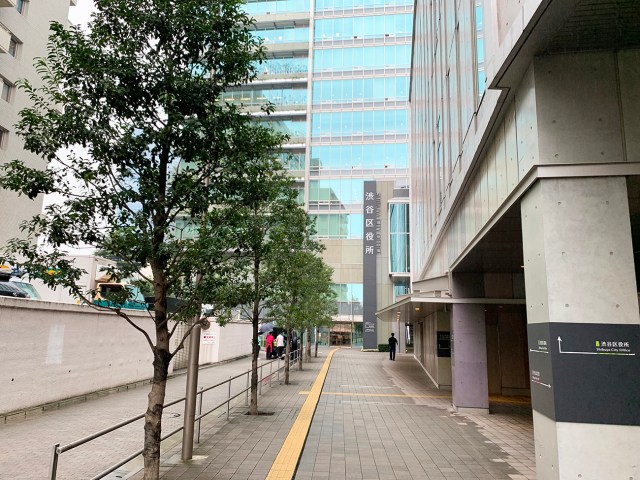
Seiji checks out the soba scene where government workers and the public can indulge in a bowl of buckwheat noodles for a very reasonable price.
Our Japanese-language reporter Seiji Nakazawa really likes soba. Like, really, really likes it. In fact, at this point, he has now officially visited 312 soba eateries throughout Japan in an effort to find the best possible buckwheat noodles.
So far, his soba travels have taken him across the land, from Yakushima in the south to Hokkaido in the north. He usually opts for unassuming eateries, even if they’re of the quick stand-and-eat variety, and takes particular delight in unexpectedly stumbling into new restaurants by chance. That’s exactly what happened when he recently found himself running errands at the Shibuya City Office, the main administrative hub for residents of Tokyo’s Shibuya Ward.
As soon as he walked in, he noticed a stand displaying the building’s cafeteria menu in front of the general facility information. An eatery on the first floor called Shibuya Hachiko Soba caught his eye.
Upon closer inspection, something else made his heart jump in excitement. Shibuya Hachiko Soba’s basic juwari soba (noodles made from 100-percent buckwheat flour) only cost 390 yen (US$2.63). Even the soba at some famous chain restaurants weren’t that cheap!
There was no way that he could leave the building without trying some soba first. He headed down the hallway to the left of the general reception and entered the cafeteria.
Rather than a soba restaurant, or even a dining area, the interior looked more like a multipurpose facility with small tables and chairs. He imagined that the room must be used for various functions throughout the week. Walking further inside, he soon spotted the kitchen area and a ticket machine.
Sure enough, the price for the juwari soba displayed on the screen was only 390 yen.
The menu in general was quite vast. Some of the options included soba with maitake mushrooms and meat on a tray (940 yen), Japanese whiting tempura soba (890 yen). There were also some other dishes such as beef curry (490 yen) and side sets for purchase. Not all soba restaurants offer these kinds of add-ons, so Seiji was delighted to see them here.
After placing his order and taking a seat, his juwari soba was soon ready.
It definitely looked like a regular tray of soba noodles–not reduced in size to explain the low price. Small spots were visible here and there on the noodles that resembled the black specks found on the regional Shinshu soba variety. He asked a worker and learned that the noodles were made using buckwheat flour produced in Horokanai, Hokkaido.
They also didn’t smell particularly strongly of buckwheat. Their thin and flat composition made them easy to dip in the accompanying sauce, which tasted strongly of bonito yet had a underlying sweetness as well.
He began slurping them in earnest to satisfy his curiosity. While they weren’t the absolute best soba he’d ever eaten, they made for a solid lunch with nothing to complain about.
Of course, they were certainly outstanding for their value.
The only potential downside to Shibuya Hachiko Soba is that it’s inside the Shibuya City Office, which is closed over the weekend. Still, Seiji will keep it in mind as a hidden gem whenever he’s investigating something in the area.
Restaurant information
Shibuya Hachiko Soba / 渋谷ハチ公そば
Address: Tokyo-to, Shibuya-ku, Udagawa-cho 1-1
東京都渋谷区宇田川町1-1
Open: 11 a.m.-2:30 p.m.
Closed: Saturday & Sunday
All images © SoraNews24
● Want to hear about SoraNews24’s latest articles as soon as they’re published? Follow us on Facebook and Twitter!
[ Read in Japanese ]

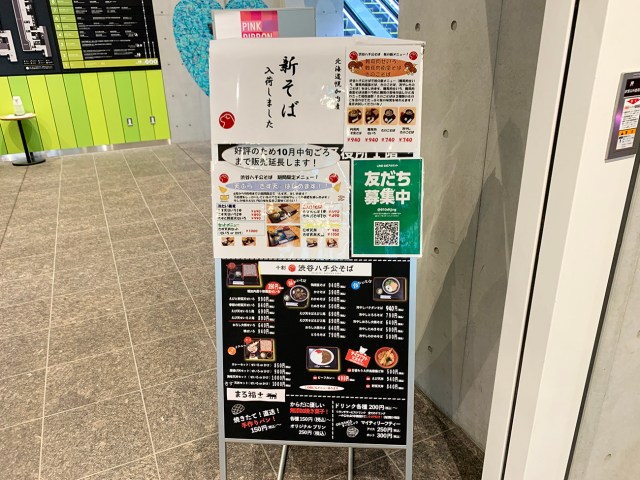
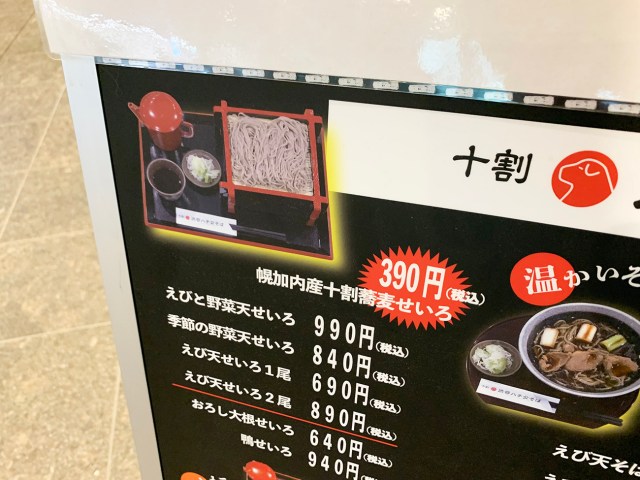
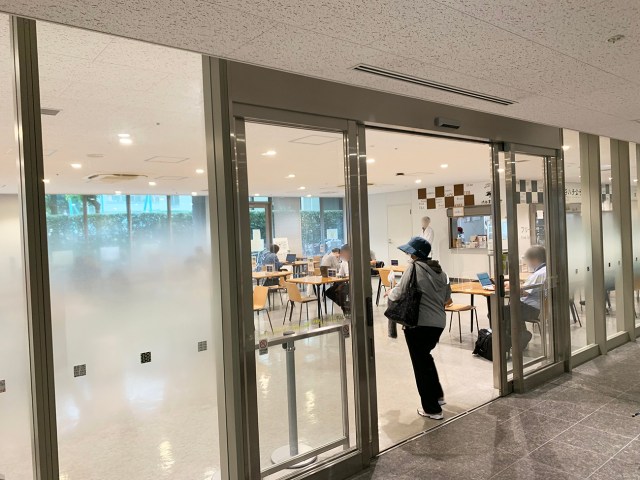
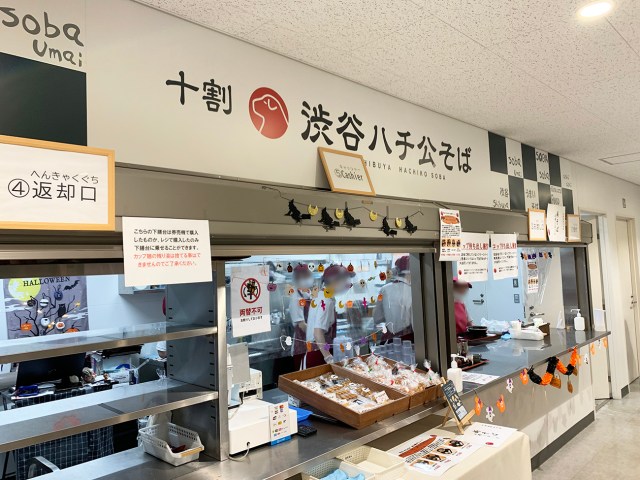
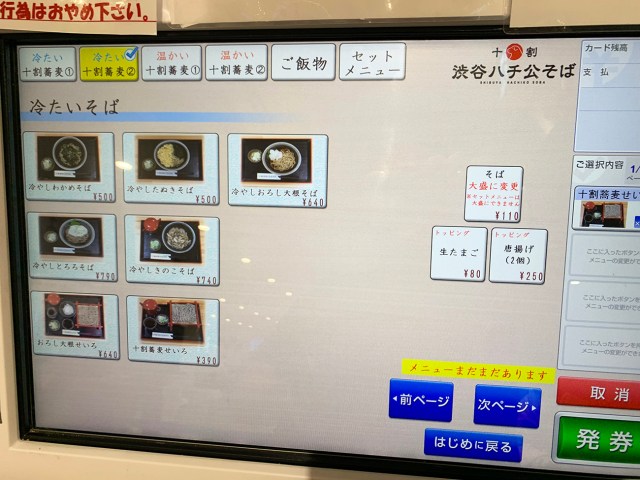
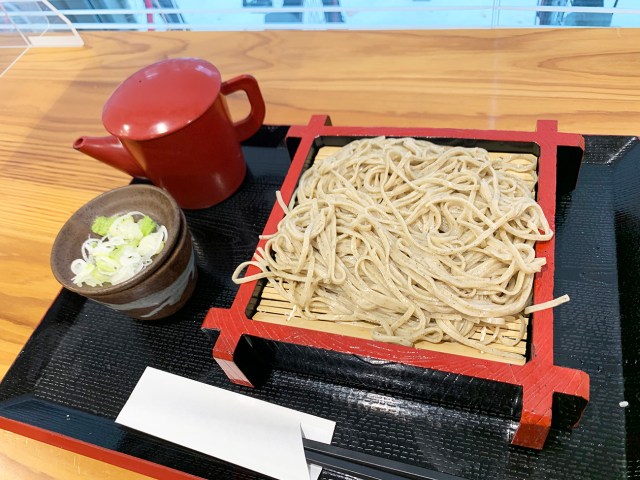
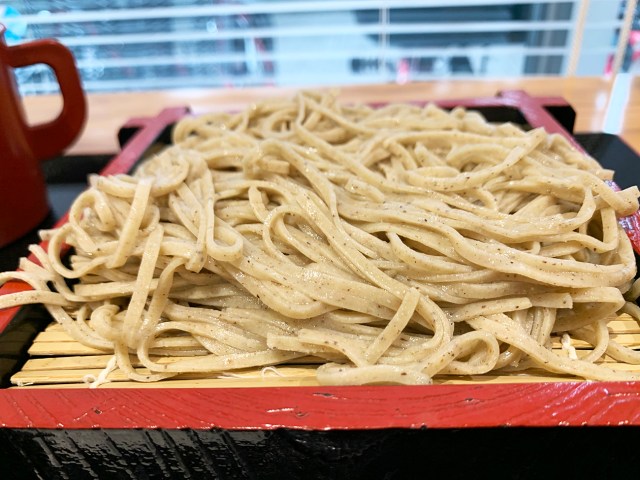
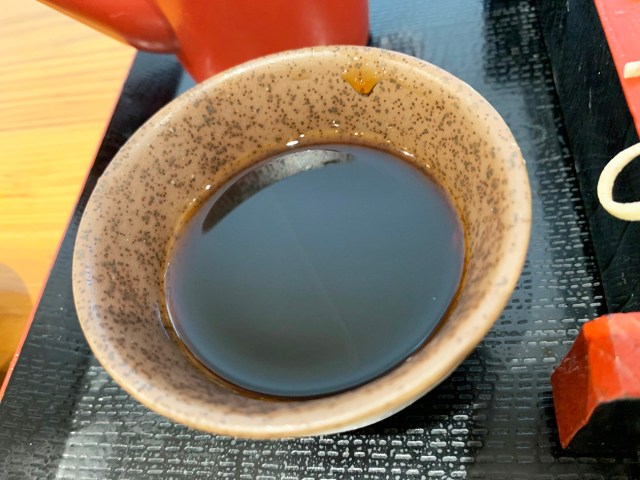
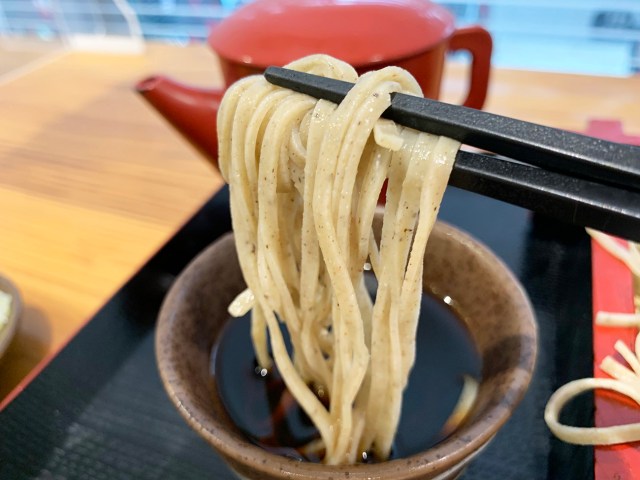
 Tokyo Secret Eats: Shibuya City staff cafeteria serves Hachiko soba to visitors
Tokyo Secret Eats: Shibuya City staff cafeteria serves Hachiko soba to visitors Why did this stand-and-eat soba noodle shop in Tokyo open in the middle of the pandemic?
Why did this stand-and-eat soba noodle shop in Tokyo open in the middle of the pandemic? Saga Prefecture’s hidden gem of a soba restaurant offers scrumptious, full course soba meals
Saga Prefecture’s hidden gem of a soba restaurant offers scrumptious, full course soba meals We try cooking yakisoba with real Japanese buckwheat soba【SoraKitchen】
We try cooking yakisoba with real Japanese buckwheat soba【SoraKitchen】 What does a family restaurant in the middle of nowhere, Hokkaido, serve? We find out
What does a family restaurant in the middle of nowhere, Hokkaido, serve? We find out Seaside scenery, history, and so many desserts on Yokohama’s Akai Kutsu【Japan Loop Buses】
Seaside scenery, history, and so many desserts on Yokohama’s Akai Kutsu【Japan Loop Buses】 Foreigner’s request for help in Tokyo makes us sad for the state of society
Foreigner’s request for help in Tokyo makes us sad for the state of society Should you add tartar sauce to Japanese curry rice? CoCo Ichi makes diners an unusual offer
Should you add tartar sauce to Japanese curry rice? CoCo Ichi makes diners an unusual offer Ghibli Park now selling “Grilled Frogs” from food cart in Valley of Witches
Ghibli Park now selling “Grilled Frogs” from food cart in Valley of Witches Japanese city loses residents’ personal data, which was on paper being transported on a windy day
Japanese city loses residents’ personal data, which was on paper being transported on a windy day Akihabara pop-up shop sells goods made by Japanese prison inmates
Akihabara pop-up shop sells goods made by Japanese prison inmates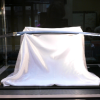 Amazing exhibition of Japan’s legendary “cursed katana” is going on right now【Photos】
Amazing exhibition of Japan’s legendary “cursed katana” is going on right now【Photos】 Yokohama restaurant serves fried axolotl, along with giant isopod, camel, and crocodile
Yokohama restaurant serves fried axolotl, along with giant isopod, camel, and crocodile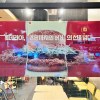 We tried Korea’s way-too-big King Tonkatsu Burger at Lotteria 【Taste Test】
We tried Korea’s way-too-big King Tonkatsu Burger at Lotteria 【Taste Test】 Larger than life Doraemon doll will delight fans, terrify pets and small children
Larger than life Doraemon doll will delight fans, terrify pets and small children McDonald’s new Happy Meals offer up cute and practical Sanrio lifestyle goods
McDonald’s new Happy Meals offer up cute and practical Sanrio lifestyle goods Japanese ramen restaurants under pressure from new yen banknotes
Japanese ramen restaurants under pressure from new yen banknotes French Fries Bread in Tokyo’s Shibuya becomes a hit on social media
French Fries Bread in Tokyo’s Shibuya becomes a hit on social media Studio Ghibli releases new action figures featuring Nausicaä of the Valley of the Wind characters
Studio Ghibli releases new action figures featuring Nausicaä of the Valley of the Wind characters Red light district sushi restaurant in Tokyo shows us just how wrong we were about it
Red light district sushi restaurant in Tokyo shows us just how wrong we were about it New private rooms on Tokaido Shinkansen change the way we travel from Tokyo to Kyoto
New private rooms on Tokaido Shinkansen change the way we travel from Tokyo to Kyoto Tokyo Tsukiji fish market site to be redeveloped with 50,000-seat stadium, hotel, shopping center
Tokyo Tsukiji fish market site to be redeveloped with 50,000-seat stadium, hotel, shopping center Beautiful Ghibli sealing wax kits let you create accessories and elegant letter decorations【Pics】
Beautiful Ghibli sealing wax kits let you create accessories and elegant letter decorations【Pics】 Studio Ghibli releases Kiki’s Delivery Service chocolate cake pouches in Japan
Studio Ghibli releases Kiki’s Delivery Service chocolate cake pouches in Japan New definition of “Japanese whiskey” goes into effect to prevent fakes from fooling overseas buyers
New definition of “Japanese whiskey” goes into effect to prevent fakes from fooling overseas buyers Our Japanese reporter visits Costco in the U.S., finds super American and very Japanese things
Our Japanese reporter visits Costco in the U.S., finds super American and very Japanese things All-you-can-drink Starbucks and amazing views part of Tokyo’s new 170 meter-high sky lounge
All-you-can-drink Starbucks and amazing views part of Tokyo’s new 170 meter-high sky lounge More foreign tourists than ever before in history visited Japan last month
More foreign tourists than ever before in history visited Japan last month New Pokémon cakes let you eat your way through Pikachu and all the Eevee evolutions
New Pokémon cakes let you eat your way through Pikachu and all the Eevee evolutions Disney princesses get official manga makeovers for Manga Princess Cafe opening in Tokyo
Disney princesses get official manga makeovers for Manga Princess Cafe opening in Tokyo Sales of Japan’s most convenient train ticket/shopping payment cards suspended indefinitely
Sales of Japan’s most convenient train ticket/shopping payment cards suspended indefinitely Sold-out Studio Ghibli desktop humidifiers are back so Totoro can help you through the dry season
Sold-out Studio Ghibli desktop humidifiers are back so Totoro can help you through the dry season Japanese government to make first change to romanization spelling rules since the 1950s
Japanese government to make first change to romanization spelling rules since the 1950s Ghibli founders Toshio Suzuki and Hayao Miyazaki contribute to Japanese whisky Totoro label design
Ghibli founders Toshio Suzuki and Hayao Miyazaki contribute to Japanese whisky Totoro label design Doraemon found buried at sea as scene from 1993 anime becomes real life【Photos】
Doraemon found buried at sea as scene from 1993 anime becomes real life【Photos】 Tokyo’s most famous Starbucks is closed
Tokyo’s most famous Starbucks is closed One Piece characters’ nationalities revealed, but fans have mixed opinions
One Piece characters’ nationalities revealed, but fans have mixed opinions We asked a Uniqlo employee what four things we should buy and their suggestions didn’t disappoint
We asked a Uniqlo employee what four things we should buy and their suggestions didn’t disappoint Princesses, fruits, and blacksmiths: Study reveals the 30 most unusual family names in Japan
Princesses, fruits, and blacksmiths: Study reveals the 30 most unusual family names in Japan We find Italian Soba at an Aomori fish market that insisted it’s perfect for the beach
We find Italian Soba at an Aomori fish market that insisted it’s perfect for the beach What the heck is okame soba?
What the heck is okame soba? Which noodles, other than Okinawa soba, pair best with Okinawa soba broth?【Taste Test】
Which noodles, other than Okinawa soba, pair best with Okinawa soba broth?【Taste Test】 Tokyo restaurant doesn’t tell you its name unless you ask, makes us appreciate life’s surprises
Tokyo restaurant doesn’t tell you its name unless you ask, makes us appreciate life’s surprises Want some carbs with your carbs? Japanese noodle restaurant offering bread soba
Want some carbs with your carbs? Japanese noodle restaurant offering bread soba Old Japanese photos show the awesome skill of soba delivery workers in the Showa era
Old Japanese photos show the awesome skill of soba delivery workers in the Showa era The best soba restaurant on Yakushima island, according to locals
The best soba restaurant on Yakushima island, according to locals Kakiage towers and Italian soba? We try out a unique soba restaurant in Tokyo
Kakiage towers and Italian soba? We try out a unique soba restaurant in Tokyo Japan’s first-ever wanko soba conveyor belt restaurant opens in Tokyo
Japan’s first-ever wanko soba conveyor belt restaurant opens in Tokyo Check if you have a soba allergy with these amazing ukiyoe-print temporary tattoos!
Check if you have a soba allergy with these amazing ukiyoe-print temporary tattoos! “Hey, Japanese taxi driver, take us to the best Yaeyama soba noodles on Ishigaki Island!”
“Hey, Japanese taxi driver, take us to the best Yaeyama soba noodles on Ishigaki Island!” We check out Kawaichi, a crazy good soba shop in Akihabara
We check out Kawaichi, a crazy good soba shop in Akihabara Chilled coffee noodles for dessert are Japan’s newest summertime sweets innovation
Chilled coffee noodles for dessert are Japan’s newest summertime sweets innovation How to turn a classic Japanese noodle dish into Studio Ghibli’s Totoro
How to turn a classic Japanese noodle dish into Studio Ghibli’s Totoro Japanese restaurant chain shows us how to make katsudon in three minutes【SoraKitchen】
Japanese restaurant chain shows us how to make katsudon in three minutes【SoraKitchen】
Leave a Reply